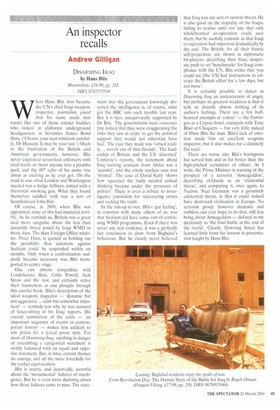An inspector recalls
Andrew Gilligan
DISARMING IRAQ by Hans Mix Bloomsblay, f16.99, pp, 285, ISBN 0747573549
lyvhen Hans Blix first became the UN's chief Iraqi weapons inspector, journalists joked that his name made him sound like one of those sinister baddies who lurked in elaborate underground headquarters in Seventies James Bond films. (`Choose your next witticism carefully, Mr Hussein. It may be your last.') Much to the frustration of the British and American governments, however. Blix never employed seven-foot enforcers with steel teeth, or threw anyone into a piranha pool, and the 007 echo of his name was about as exciting as he ever got. On the road to war, what London and Washington needed was a Judge Jeffreys, armed with a rhetorical smoking gun. What they found themelves saddled with was a sort of Scandinavian John Birt.
Of course, in 2000, when Blix was appointed, none of this had mattered terribly. As he reminds us, Britain was a great deal more sanguine about the less than dastardly threat posed by Iraqi WMD in those days. The then Foreign Office minister, Peter Hain, is quoted as holding out the possibility that sanctions against Saddam could be suspended within six months. Only when a confrontation suddenly became necessary was Blix transported to centre stage.
One can almost sympathise with Condoleezza Rice, Colin Powell, Jack Straw and the rest, and certainly relive their frustration, as one ploughs through this careful book. Blix's description of the ideal weapons inspector — 'dynamic but not aggressive ... calm but somewhat impatient' — reminds you why he was accused of fence-sitting in his Iraqi reports. His overall summation of the crisis — an important sequence of events in contemporary history — makes him unlikely to win prizes for a lyrical prose style. For most of Disarming Iraq, anything in danger of resembling a categorical statement is swiftly balanced with an equal and opposite statement. But, in time, certain themes do emerge, and all the more forcefully for the earlier equivocation.
Blix is utterly, and deservedly, scornful about the 'monumental' failures of intelligence. But he is even more damning about how those failures came to pass. The state
ment that the government knowingly distorted the intelligence is, of course, what got the BBC into such trouble last year. But it is here unequivocally supported by Dr Blix. .The governments were conscious [my italics] that they were exaggerating the risks they saw in order to get the political support they would not otherwise have had.' The case they made was 'virtual reality ... woven out of thin threads'. The leadership of Britain and the US 'distorted' Unmovic's reports, the statement about Iraq seeking uranium from Africa was a 'scandal', and the whole nuclear case was 'twisted'. The case of David Kelly 'shows how squeezed the badly needed critical thinking became under the pressures of politics'. There is even a tribute to investigative journalists for 'uncovering errors and seeking the truth'.
In the run-up to war, Blix's 'gut feeling', in common with many others of us, was that Saddam did have some sort of continuing WMD programme. Even if there was never any real evidence, it was a perfectly fair conclusion to draw from Baghdad's behaviour. But he clearly never believed that Iraq was any sort of current threat. He is also good on the stupidity of the Iraqis, failing to realise until too late that only wholehearted co-operation could save them; but he usefully reminds us that Iraqi co-operation had improved dramatically by the end. The British, for all their frantic self-projection, are shown as diplomatic bit-players: describing their final, desperate push to set 'benchmarks' for Iraqi compliance with the UN, Blix writes that 'you could see [the US] had instructions to tolerate the British effort for a few days, but not more'.
It is certainly possible to detect in Disarming Iraq an undercurrent of anger, but perhaps its greatest weakness is that it tells us directly almost nothing of its author's feelings. There are a few halfhearted attempts at 'colour' — the flamingos at a Cyprus hotel, crumpets with Tony Blair at Chequers — but very little indeed of Hans Blix the man. Blix's lack of emotion made him an excellent weapons inspector, but it also makes for a distinctly flat read.
There are worse sins. Blix's boringness has served him and us far better than the high-pitched certainties of others. As I write, the Prime Minister is warning of the prospect of a terrorist 'Armageddon', describing al-Qaeda as an 'existential threat', and comparing it, once again, to Nazism. Nazi Germany was a genuinely existential threat, in that it could indeed have destroyed civilisation in Europe. No terrorist group, however dramatic and ruthless, can ever hope to do that, still less bring about Armageddon — defined in my dictionary as 'the final battle at the end of the world'. Clearly, Downing Street has learned little from the lessons in presentation taught by Hans Blix.


















































































 Previous page
Previous page